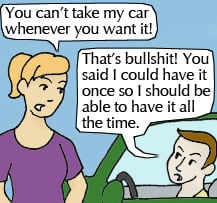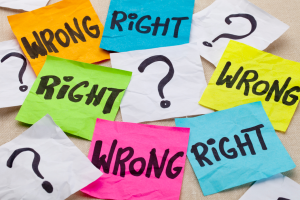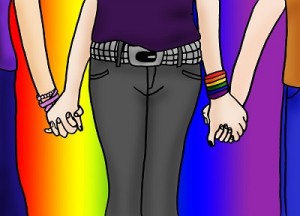Fun fact: I’m totally crazy.
And I say this with pride, actually – what I’ve endured has made me a more courageous, empathetic, and determined person.
People on the whole find my honesty about this a bit jarring, though.
They usually don’t know what to say when I “come out” as mentally ill. Too often, people will try to compliment me somehow, to indicate that they’re accepting of me – but what they think is a compliment isn’t one at all.
Take, for example, when I share that I’m mentally ill. Half the time, people defensively respond, “Oh, Sam! Don’t say that. You aren’t crazy!”
What they’re saying, without really realizing it, is that I don’t fit their idea of what a mentally ill person looks like, and that being crazy is a shameful thing that I shouldn’t associate myself with.
What I’m hearing is invalidation.
Not only are they refusing to recognize that this is an important part of my lived experience, but they’re also saying that mentally ill people look and behave a very specific way – rather than acknowledging that it’s a broad spectrum of experiences.
The impulse to tell me I’m not crazy says a lot about the reluctance people have to associate “good” people like me with something as “bad” as being mentally ill.
That being said, I do get it.
There’s so much stigma around mental illness that it can be hard to figure out the “right” thing to say when someone discloses their illness(es) to you.
We don’t always get it right the first time. We stumble. And sometimes we stumble really often.
Being supportive of mentally ill folks has a steep learning curve. Even for me, as someone who has mental illnesses, I’m constantly learning and relearning how to be supportive of the other people in my life whose experiences are different from mine.
That’s why I want to open up a conversation about the “compliments” mentally ill people are given, and the ways in which our good intentions don’t always line up with the impact our words have.
If you aren’t sure what I mean, here are six really common examples of backhanded “compliments” that we say to mentally ill people – and why they’re so problematic.
1. ‘Wow, You Don’t Seem Crazy At All!’
The first question I want to ask when people say this to me is: What exactly do you mean by that?
Are you saying it’s because I’m too friendly? Too smart? Too calm? Too successful? Because that means you think that mentally ill can’t be friendly, smart, calm, or successful – so you’re not just insulting me, but every mentally ill person out there.
When neurotypical people meet me and realize that I’m both crazy and relatable, it forces them to confront the uncomfortable truth that mentally ill people aren’t an abstract, far-removed population – we are your friends, your neighbors, your loved ones.
Here’s the complex reality.
I’ve been institutionalized (twice this last year). I’ve attempted suicide. I’ve struggled with delusions and paranoia. I take an anti-psychotic, two anti-depressants, and a mood stabilizer every day. I’m borderline as all get out.
Sometimes, I’m the kind of crazy that scares people – the person that makes you fearfully switch seats on the bus, that you can’t help but stare at.
I also love watching Golden Girls. I like to make people laugh, and I’m an optimist at heart. I think Lebanese food is out of this world. I’m terrible at bowling but I enjoy it anyway. I’m a feminist with unshakeable convictions and a writer with undeniable passion. And yes, I am a loyal and caring friend to many.
The complex reality that I’m talking about is this: Mentally ill people are dynamic, layered, and complicated people (the operative word here being people).
If this shocks you, it’s time to unpack why. Why don’t I “seem” mentally ill to you? Is it because your idea of what we “should” look like is too limited?
2. ‘It Could Be Worse – At Least You Don’t Have [Insert Any Mental Illness Here]’
This is a misguided favorite of many.
“Oh, you have depression? At least you don’t have schizophrenia!”
“Yikes, anxiety is tough. You know, I watched a documentary on bipolar disorder recently – at least you don’t have that!”
This is just a sneaky way of saying, “Your problems are lousy, but they aren’t that bad!”
No one who is grappling with mental illness wants to be told that their problems aren’t that important. The reality is that mental illness is tough, no matter what the diagnosis is. Invalidating this truth is the quickest way to ensure that this person won’t trust you with their problems in the future.
This “compliment” can lead a person to shut down altogether – worried that you don’t actually take their struggles seriously – and erodes the trust between you.
The example I always use is about someone getting into a car crash. Imagine you’ve gotten into an accident and, stressed out and rattled, you call a friend to vent about what happened.
“A car crash?” they exclaim. “That’s not so bad. I heard about another guy in Florida whose truck was swallowed up by a sinkhole!”
You called because you wanted someone to commiserate with. You called because you wanted your stress to be acknowledged. Instead, they dismissed your feelings by talking about sinkholes – which is hardly relevant in a moment when all you wanted was their support!
The next time someone tells you about their mental illness, don’t bring up the metaphorical sinkhole. Validate their feelings, and most importantly, let them know you’ve got their back.
3. ‘But You’re So Strong! Are You Sure You Need Therapy/Medication?’
Being strong has nothing to do with needing treatment.
This bears repeating: Being strong has nothing to do with needing treatment.
Yes, I’m one tough cookie! But mental illness couldn’t care less about that – mental illness tears down tough people all the time (in fact, people surviving mental illness are some of the strongest people I know!).
Put another way, saying this to me suggests that only weak people need therapy or medication. It says that mental health care is for people who just aren’t “strong enough” to push back against mental illness. This is patently untrue and a harmful assumption.
Psychotropic medication and therapy has saved my life.
It helped stabilize and empower me. It helped me take control of my life and allowed me to manage my mental illness in a way that I couldn’t do on my own. Making the decision to get help is one of the bravest decisions I’ve ever made.
My commitment to recovery in the face of stigma is proof that I’m strong, and my belief that I could get better as I struggled with severe mental illness is a testament to how resilient I am.
I’m strong! And I drew from that strength the day I decided I wasn’t going to let mental illness run the show.
Besides, whether or not I “need” therapy or medication is a decision I get to make with the clinicians who are familiar with my disorders and my history. I get to decide the best path to wellness – and unsolicited advice only tells me that you believe you know me better than I know myself.
4. ‘Oh, I’m Totally OCD Sometimes, Too.’
I struggle with obsessions.
Sometimes I spiral, and the panic can consume entire months of my life. Imagine being trapped in the same irrational thought patterns from the time you wake up until you go to sleep – and the more you resist, the louder and more overwhelming it gets!
I once spent two months straight having panic attacks about whether or not I was attracted to my psychiatrist. This probably sounds funny, and it is to me now, but while it was happening it was complete torture.
I knew it wasn’t rational and that it didn’t matter – just like my friends kept telling me – but from morning to night, I was completely consumed by fear and shame. Logic had no effect on the spiraling.
So imagine how frustrating it is for me when I hear people say, “OCD? I’m that way too!” followed up by, “I’m so organized, it’s like, scary!”
If you don’t actually understand what it’s like to struggle with a mental illness, it’s offensive to pretend that you do.
Your “fun” or interesting quirks are not the same as a disabling psychiatric condition – and saying that it is is an insult to anyone that struggles with it.
When I have obsessions, they take over my life. They can even land me in the hospital.
Because the thoughts are so overwhelming, I want to hurt myself to try to make them stop. The way you organize your books by color and alphabetically just isn’t comparable to this level of distress and dysfunction.
If you’re using mental illnesses as adjectives, it’s time to educate yourself about these very real disorders – because mental illness is disabling, not cute.
5. ‘I Knew Someone Who Had That, I’m Glad You Aren’t Like Them!’
I have borderline personality disorder, a highly stigmatized disorder. And too often, people respond to this fact by saying something like, “Whoa, I knew someone like that. They were nuts. I’m glad you seem to have it under control!”
Um, what?
I’m so put-off when people say this to me.
Firstly, it tells me that BPD is a disorder you’re already biased against. Secondly, it tells me that you would think less of me if my BPD were more perceivable to you. And lastly, it says that you’re okay with putting other mentally ill people down if they’re “too much” for you.
What happens the next time I’m struggling with my disorder? Will you think I’m too crazy to be your friend? Will you see the illness instead of my humanity? Can I trust you? Will you make an example of me behind my back?
To be diagnosed with borderline, you need to have at least five of nine diagnostic criteria. That means there are actually 256 ways to have this disorder – not to mention, there are different types and subcategories that complicate this even further.
Things like trauma history, co-morbid disorders, substance use, therapy, and medication mean that it can present in even more ways on top of that! Mathematically speaking, then, there are thousands of ways to have BPD!
Taking this into account, it’s easy to see why making assumptions about people simply because they’re diagnosed with borderline (or any disorder, really) is pretty useless – the BPD diagnosis only loosely describes a pattern of behaviors, and those behaviors are highly variant in the population based on biological, psychological, and social factors.
Put another way, just because someone you knew shares a diagnosis with me, that doesn’t necessarily tell you anything about what your relationship with me will be like, and that doesn’t by default explain why they were unlikable or unkind to you in the first place.
People with mental illness, and people in general, are all uniquely situated and complex human beings.
Sometimes bad or abusive people are just that – bad and abusive. Mental illness doesn’t by default make you either of those things.
In fact, mentally ill people are more often the victims of violence and abuse than the perpetrators. That was certainly true for me.
It’s definitely not a compliment to tell me that you’re glad I have it “under control” (which is a pretty big assumption in the first place!). Insulting someone you knew to make me feel like a “special exception” just upholds the harmful idea that my mental illness is a shameful condition that I should disassociate myself from as much as possible.
This is a part of me. That’s very true. But if you’re using it as a point of reference to draw conclusions about me or decide how to treat me, you might need to interrogate your own biases and ableism.
6. ‘Don’t Talk Like That! There’s Nothing Wrong with You.’
A lot of people like to say to me, “Oh honey, there’s nothing the matter with you!” I think what they’re trying to say is that when they look at me, they don’t see me as mentally ill – they see me as a good, capable, and kind person (as if I can’t be both!).
But what I hear is something like, “I’m choosing to ignore your struggles because I don’t believe you.”
And this is at the core of a lot of these “compliments” I’ve written about – it’s about not believing mentally ill people when they articulate their experiences.
I’m not necessarily saying that mental illness is something that’s “wrong” about me when I bring it up. When you say that “nothing’s wrong,” you’re only projecting your own bias by suggesting that mentally ill people are defective in the first place.
What I am saying is that it’s a big part of my lived experiences, and it’s important to me. And if you care about my struggles, you’ll validate it as real and significant, too.
That being said, mentally ill people have differing feelings about their illnesses (we’re a diverse bunch!). Some do feel something is wrong with them, and that’s okay. Some people feel it’s a natural variation in the human experience, and not something wrong or defective, and that’s cool, too!
Some don’t even refer to them as illnesses, advocating for a neurodiverse approach rather than one that pathologizes us. And I’m in total support of that framework, too, and have learned so much from the folks who advocate for it!
This is why, like with any of the “compliments” I’ve talked about, the biggest mistake you can make is bringing your own baggage into the conversation by trying to define our experiences for us.
The big takeaway of this article is: It’s crucial – absolutely critical – to take your cues from the person you’re talking to. Believe us when we talk about our experiences, and affirm and mirror how we’ve chosen to speak about our journey.
This means you should tune in, decentering your own assumptions and what you think you know, and instead, learn from us and what we share with you.
If you do that, I can almost guarantee that you’ll not only avoid these lousy “compliments” – you’ll ensure that the person you’re speaking with feels validated, cared for, and supported.
And really, at the end of the day, that’s what matters most.
[do_widget id=’text-101′]
Sam Dylan Finch is a Contributing Writer at Everyday Feminism and the Associate Editor at RESIST. He is a transgender writer, activist, and educator based in the San Francisco Bay Area. He is also the founder of Let’s Queer Things Up!, a blog exploring the intersections of mental illness and queerness. You can learn more about him here, admire his face on Instagram, check out his portfolio, and become best friends on Twitter @samdylanfinch. Read his articles here.
Search our 3000+ articles!
Read our articles about:
Our online racial justice training
Used by hundreds of universities, non-profits, and businesses.
Click to learn more
Most Read Articles
- « Previous
- 1
- …
- 30
- 31
- 32




















